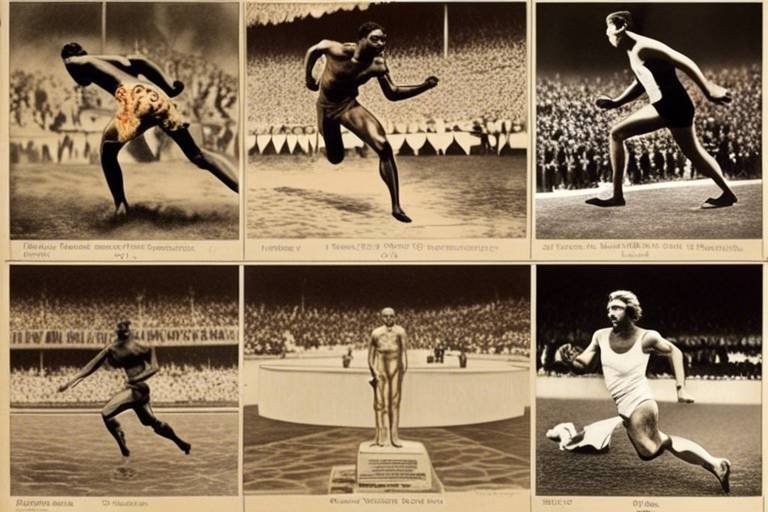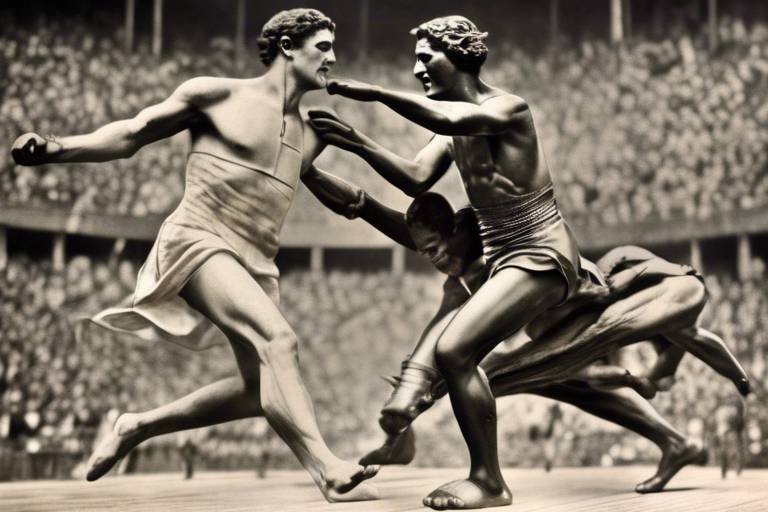The Political Legacy of Ancient Greece
Ancient Greece, with its rich political legacy, stands as a beacon of democratic principles and governance that have shaped the course of history. The political system of ancient Greece was characterized by city-states, each with its own unique structure and laws. Among these city-states, Athens stood out for its pioneering form of direct democracy, where citizens actively participated in decision-making processes. This early form of democracy laid the groundwork for modern democratic ideals, emphasizing equality before the law and the right to vote.
Furthermore, Greek philosophical thought, as exemplified by luminaries like Plato and Aristotle, delved deep into political theory and ethics. Their ideas on justice, virtue, and the ideal state continue to influence political discourse and governance systems worldwide. The concept of citizenship in ancient Greece was paramount, defining the rights and duties of individuals within the political community. Citizenship conferred the right to vote, hold office, and serve in the military, highlighting the importance of active civic engagement.
The structure of Greek city-states, known as polis, varied widely, ranging from oligarchies to democracies. These independent entities had their own laws, political systems, and cultural norms, shaping governance and societal interactions. Military strategies and tactics employed by ancient Greeks, such as the phalanx formation and naval warfare techniques, were revolutionary for their time and left a lasting impact on military history.
The enduring legacy of ancient Greece on modern politics is undeniable. Concepts like citizenship, democracy, and the rule of law can be traced back to the innovative practices of the ancient Greeks. Moreover, the ancient Olympic Games served not only as a sporting event but also as a platform for political diplomacy and competition among city-states, fostering unity and influencing international relations.
Art and architecture in ancient Greece were not just aesthetic expressions but also powerful symbols of political ideals and authority. Sculptures and buildings served as manifestations of civic pride and political narratives, shaping identities and influencing societal perceptions. The artistic achievements of ancient Greece continue to inspire and inform political discourse to this day.

Athenian Democracy
Topics to be discussed in the article include the political system of ancient Greece, the concept of democracy, the influence of Greek philosophy on governance, the role of citizenship, the structure of the city-states, military strategies, and the lasting impact on modern politics.
Athenian democracy was one of the earliest forms of direct democracy where citizens participated in decision-making. It laid the foundation for modern democratic principles such as equality before the law and the right to vote.
The Athenian democracy system allowed citizens to have a direct say in the governance of their city-state. This active involvement in decision-making empowered individuals and promoted a sense of community and responsibility.
Furthermore, the concept of democracy in ancient Athens was not limited to a select few but extended to a large portion of the population, emphasizing the importance of inclusivity and participation in political affairs.
Through the practice of direct democracy, Athenian citizens were able to voice their opinions, propose laws, and serve in various governmental positions, fostering a sense of ownership and engagement in the political process.
The Athenian democracy system set a precedent for future political structures by highlighting the significance of citizen involvement and accountability in shaping a just and equitable society.
Overall, Athenian democracy serves as a testament to the enduring impact of ancient Greek political ideals on the development of democratic principles and governance systems.

Greek Philosophical Thought
Topics to be discussed in the article include the political system of ancient Greece, the concept of democracy, the influence of Greek philosophy on governance, the role of citizenship, the structure of the city-states, military strategies, and the lasting impact on modern politics.
Athenian democracy was one of the earliest forms of direct democracy where citizens participated in decision-making. It laid the foundation for modern democratic principles such as equality before the law and the right to vote.
Greek philosophers like Plato and Aristotle explored political theory, ethics, and governance, influencing Western political thought. Their ideas on justice, virtue, and the ideal state continue to shape political discourse.
Citizenship in ancient Greece conferred rights and responsibilities, including participation in the political process. It defined who could vote, hold office, and serve in the military, reflecting the importance of civic engagement.
Greek city-states, or polis, were independent entities with unique political systems, laws, and cultures. The structure of city-states varied, from oligarchies to democracies, impacting governance and societal norms.
Ancient Greek military prowess, exemplified by the phalanx formation and naval strategies, influenced warfare for centuries. Their innovative tactics and disciplined armies were instrumental in conflicts such as the Persian Wars.
The political legacy of ancient Greece endures in modern governance systems, institutions, and values. Concepts like citizenship, democracy, and the rule of law trace their origins back to the ancient Greeks, shaping contemporary political structures.
The ancient Olympic Games were not only a sporting event but also a platform for political diplomacy and competition among city-states. The Games fostered unity, showcased power, and influenced international relations in the ancient world.
Greek art and architecture reflected political ideals and power dynamics, with sculptures and buildings serving as symbols of civic pride and authority. The artistic achievements of ancient Greece played a significant role in shaping political narratives and identities.

Citizenship in Ancient Greece
Citizenship in ancient Greece was a defining aspect of political and social life, shaping the rights and duties of individuals within the city-state. In ancient Greek society, citizenship was not granted universally but was exclusive to free adult males who were born in the city-state and had completed military training. This limited definition of citizenship meant that only a fraction of the population could actively participate in the political process, hold public office, and serve in the military.
Being a citizen in ancient Greece conferred certain privileges, such as the right to vote in the assembly, participate in decision-making, and access legal protections. Citizens were expected to fulfill civic duties, including military service during times of conflict, contributing financially to the state, and engaging in public affairs. Citizenship was intertwined with identity and belonging, as it defined one's place in society and access to political power.
The concept of citizenship in ancient Greece varied across different city-states, with each polis having its own criteria for who qualified as a citizen. While some city-states like Athens granted citizenship based on descent, others like Sparta focused on military prowess and loyalty to the state. This diversity in citizenship requirements reflected the unique political structures and values of each city-state, shaping the dynamics of governance and social hierarchy.
Furthermore, citizenship in ancient Greece was not only a legal status but also a moral and political obligation. Citizens were expected to uphold the values of the polis, defend its interests, and contribute to the common good. This sense of civic responsibility fostered a strong sense of community and solidarity among citizens, reinforcing the importance of active participation in public life.
Overall, citizenship in ancient Greece was a fundamental aspect of political organization, defining the rights and responsibilities of individuals within the city-state. It served as a cornerstone of democracy, reflecting the ideals of civic engagement, equality before the law, and collective decision-making that continue to resonate in modern political systems.

City-States Structure
In ancient Greece, the city-states, known as polis, were fundamental political units that shaped the social and governmental landscape of the region. Each city-state operated as an independent entity with its own government, laws, and customs, reflecting the diverse political structures present in ancient Greece. These city-states varied in size, population, and power, with some like Athens and Sparta gaining prominence for their military strength and political influence.
The structure of city-states was crucial in defining the governance and societal norms within each community. While some city-states embraced democratic principles, allowing citizens to participate in decision-making processes, others were ruled by oligarchies or tyrants. This diversity in governance led to contrasting political ideologies and policies across different city-states, shaping the political discourse of ancient Greece.
Furthermore, the city-state structure influenced the relationships between communities, often leading to alliances or conflicts based on shared interests or rivalries. City-states engaged in diplomatic negotiations, trade agreements, and military alliances to safeguard their interests and maintain stability in the region. The interactions between city-states were integral to the political dynamics of ancient Greece, showcasing the complexities of power struggles and diplomatic maneuvers.
Moreover, the city-state structure extended beyond political governance to encompass cultural, social, and economic aspects of society. Each city-state developed its own traditions, religious practices, and artistic expressions, contributing to the rich tapestry of Greek civilization. The cultural identity of a city-state often reflected its political values and priorities, with art, literature, and architecture serving as visual representations of political ideals and power dynamics.
Overall, the structure of city-states in ancient Greece played a pivotal role in shaping the political landscape of the region, fostering diverse forms of governance, cultural expressions, and societal interactions. The legacy of these city-states continues to influence modern political systems and historical understanding, highlighting the enduring impact of ancient Greek political structures on contemporary society.

Military Strategies and Tactics
Ancient Greek military strategies and tactics were renowned for their innovation, discipline, and effectiveness on the battlefield. One of the most iconic formations used by the Greeks was the phalanx, a tightly packed infantry formation that provided both offensive and defensive capabilities. This formation, with soldiers interlocking their shields and spears, created a formidable wall of protection against enemy attacks.
Furthermore, Greek naval strategies were equally impressive, with the development of triremes - fast and maneuverable warships propelled by rowers. These naval vessels played a crucial role in securing maritime dominance and conducting naval warfare. The Battle of Salamis, where the Greek fleet defeated the Persians, showcased the strategic prowess of Greek naval forces.
A key aspect of Greek military success was their emphasis on training and discipline. Soldiers underwent rigorous physical training, honing their combat skills and instilling a sense of unity and cohesion within the ranks. This discipline was evident in their ability to execute complex maneuvers and maintain formation integrity even under intense pressure.
Moreover, the Greeks employed innovative tactics that exploited their terrain and knowledge of enemy weaknesses. For example, at the Battle of Marathon, the Athenians utilized their familiarity with the local landscape to outmaneuver the larger Persian army, resulting in a decisive victory. This strategic acumen and adaptability set the Greeks apart on the battlefield.
Overall, the military strategies and tactics of ancient Greece not only secured their dominance in the ancient world but also left a lasting legacy in the annals of warfare. The combination of disciplined infantry formations, advanced naval tactics, and strategic thinking continues to inspire military leaders and historians to this day.

Legacy on Modern Politics
The legacy of ancient Greece on modern politics is profound and far-reaching. The concepts and principles developed in the city-states of antiquity continue to shape contemporary governance systems and political ideologies. One of the most significant contributions of ancient Greece to modern politics is the concept of democracy. The Athenian model of direct democracy, where citizens actively participated in decision-making processes, laid the groundwork for the democratic principles we uphold today.
Ancient Greek philosophers such as Plato and Aristotle delved into political theory and ethics, leaving a lasting impact on Western political thought. Their philosophical inquiries into justice, virtue, and the ideal state continue to influence political discourse and policy-making. The emphasis on rationality, morality, and the pursuit of the common good can be traced back to the teachings of these renowned thinkers.
The notion of citizenship in ancient Greece, which granted individuals both rights and responsibilities within the community, remains a fundamental aspect of modern political systems. The concept of civic engagement, where citizens actively participate in governance and public life, is rooted in the practices of ancient Greek city-states. The idea that individuals have a stake in the affairs of their society and a duty to contribute to its well-being has endured through the centuries.
The structure of Greek city-states, with their diverse forms of government and distinct cultural identities, has influenced the development of modern political institutions. The varied political systems, from oligarchies to democracies, demonstrate the range of governance models that have evolved over time. The legacy of city-states can be seen in the decentralized nature of modern states and the balance of power between local and central authorities.
Ancient Greek military strategies and tactics have also left a lasting mark on modern warfare and defense. The innovative techniques employed by Greek armies, such as the phalanx formation and naval warfare tactics, have been studied and adapted by military strategists throughout history. The discipline, organization, and strategic thinking of ancient Greek military leaders continue to inform contemporary military doctrine.
In conclusion, the enduring legacy of ancient Greece on modern politics is evident in the foundational principles of democracy, citizenship, city-state governance, and military strategy. The insights and innovations of the ancient Greeks have shaped the political landscape of the present day, serving as a testament to the enduring influence of this remarkable civilization.

Olympics and Political Influence
The ancient Olympic Games held in Greece were not just about athletic competition; they also wielded significant political influence. These games served as a platform for city-states to engage in diplomatic relations, showcase their power, and compete for prestige and honor. Athletes from various regions would gather to participate in events, representing their city-states and fostering a sense of unity among the Greek communities.
Moreover, the Olympics played a crucial role in shaping international relations in the ancient world. The truce known as the "Olympic Truce" was established during the games to ensure safe passage for athletes and spectators, promoting peace and cooperation among warring city-states. This tradition highlighted the value of sportsmanship and peaceful resolution of conflicts, transcending political differences through athletic competition.
The victors of the Olympic Games were not only celebrated for their athletic achievements but also hailed as heroes and symbols of their city-states' power and glory. Winning in the Olympics brought honor and prestige to the victor's homeland, enhancing its reputation and influence on the political stage. The games provided a platform for city-states to demonstrate their strength, prowess, and cultural superiority, influencing perceptions and alliances among the Greek states.

Art and Architecture in Politics
Art and architecture played a pivotal role in shaping the political landscape of ancient Greece. From grand temples to intricate sculptures, every artistic creation carried a message of power, ideology, and civic identity. The Parthenon, a symbol of Athenian democracy and cultural superiority, stands as a testament to the fusion of art and politics in ancient Greece. Its majestic columns and intricate friezes not only showcased architectural brilliance but also conveyed political messages of strength and unity.
Ancient Greek sculptures, such as the famous statue of Athena Parthenos, embodied political ideals and religious beliefs. These sculptures adorned public spaces, serving as visual representations of civic pride and divine protection. The intricate details and lifelike forms of these sculptures captured the essence of Greek political thought, emphasizing values like courage, wisdom, and justice.
Furthermore, the layout of ancient Greek cities, with their agora (central marketplace) and acropolis (citadel), reflected the political and social organization of the city-state. The architectural design of these urban centers symbolized the importance of public life, governance, and communal activities. The agora served as a hub for political discussions, legal proceedings, and social gatherings, fostering civic engagement and democratic values.
Art and architecture not only embellished the physical landscape of ancient Greece but also served as propaganda tools for political leaders and elite classes. Monuments, statues, and public buildings were constructed to glorify rulers, commemorate military victories, and reinforce social hierarchies. The architectural splendor of structures like the Temple of Zeus at Olympia and the Theater of Epidaurus reflected the political ambitions and cultural achievements of Greek city-states.
In conclusion, art and architecture were integral components of political discourse in ancient Greece, influencing public perception, civic identity, and power dynamics. The artistic legacy of the Greeks continues to inspire contemporary political narratives and aesthetic sensibilities, highlighting the enduring impact of visual culture on governance and society.
Frequently Asked Questions
- What was the political system of ancient Greece like?
Ancient Greece had a diverse range of political systems across its city-states, including democracies, oligarchies, and monarchies. Each city-state had its own unique governance structure, laws, and political institutions.
- How did Athenian democracy differ from modern democracy?
Athenian democracy was a direct form of democracy where citizens directly participated in decision-making. In contrast, modern democracies often involve elected representatives making decisions on behalf of the people.
- What role did citizenship play in ancient Greek society?
Citizenship in ancient Greece was a defining factor in determining one's rights and responsibilities. Citizens had the privilege of participating in the political process, holding office, and serving in the military.
- How did Greek philosophy influence politics?
Greek philosophers like Plato and Aristotle contributed to political theory and ethics, shaping ideas about governance, justice, and the ideal state. Their philosophical insights continue to influence political discourse.
- What impact did ancient Greek military strategies have on warfare?
Ancient Greek military tactics, such as the phalanx formation and naval strategies, were highly influential and set the stage for military innovations in later periods. Their disciplined armies and innovative approaches shaped the course of warfare.
- How has the political legacy of ancient Greece influenced modern politics?
Ancient Greece's political legacy is evident in modern governance systems, institutions, and values. Concepts like democracy, citizenship, and the rule of law have their roots in ancient Greek political thought, shaping contemporary political structures.



















